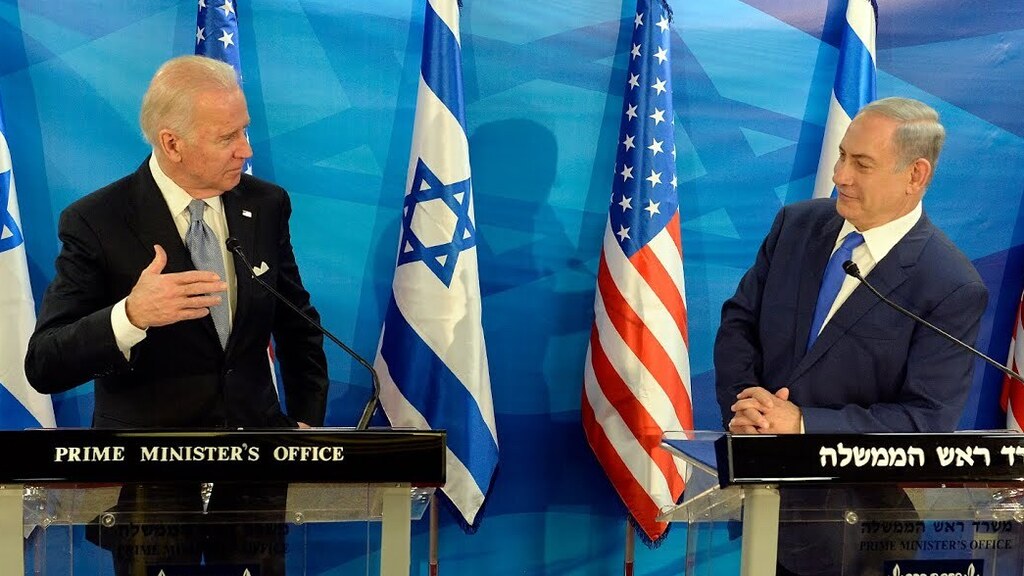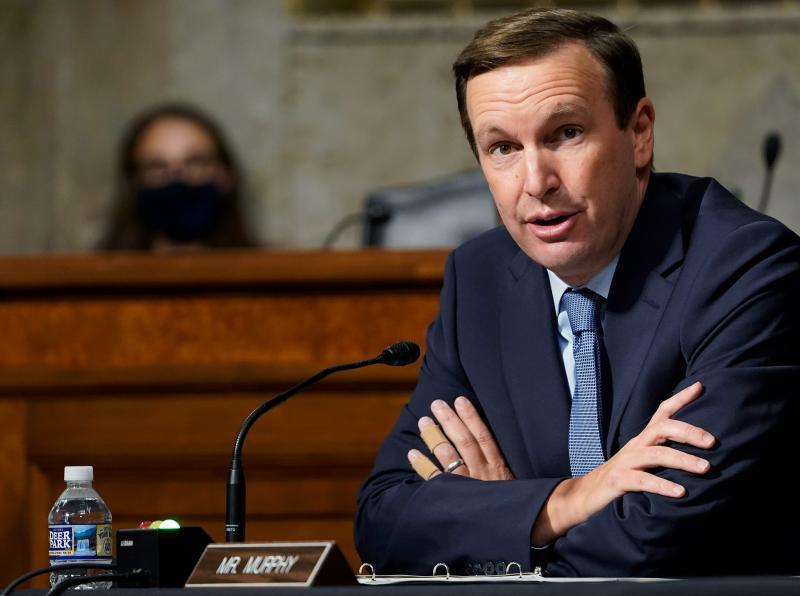U.S. President Joe Biden is trying to extinguish a fire that threatens to incinerate the bipartisan nature of the American-Israeli relationship in the wake of the latest conflict in Gaza.
“There is no shift in my commitment to the security of Israel. No shift. Period,” Biden told reporters on Friday, hours after a ceasefire went into effect.
6 View gallery


Then-U.S. vice president Joe Biden and Prime Minister Benjamin Netanyahu addressing the press in Jerusalem, March 2016
(Photo: U.S. Embassy in Israel)
“My party still supports Israel. Let’s get something straight: Until the region says, unequivocally, they acknowledge the right of Israel to exist as an independent Jewish state, there will be no peace,” he added.
Biden’s comments were coupled with his administration blocking United Nations Security Council action during the latest round of violence and its consistent acknowledgement throughout the fighting of Israel’s right to defend itself.
It is ultimately Congress that holds the purse strings, and a relatively small but increasingly vocal number of Democrats on Capitol Hill used the 12 days of fighting to publicly challenge Israeli actions vis a vis the Palestinians, along with the long-standing structure of the bilateral security and defense partnership.
Some see the rebellion as little more than a nuisance.
“The majority of members of Congress, some 350 senators and representatives – both Republicans and Democrats, publicly condemned the Iranian-backed terrorist attacks and stood up for Israel’s right to defend its citizens from Hamas’ rockets,” says Jeff Mendelsohn, executive director of Pro-Israel America.
6 View gallery


A pro-Palestinian protest in Michigan last week as U.S. President Joe Biden visited the state
(Photo: AFP)
Mendelsohn’s organization recruits congressional candidates from across the political spectrum and provides information to voters about pro-Israel candidates running for federal office.
“Unfortunately, the small but loud chorus of anti-Israel voices chose to demonize Israel and actively worked to undermine our democratic ally’s ability to defend itself against relentless attacks," he says.
"Their proposals to cut off assistance to our ally in a time of need only further fueled the fire and violence coming from Hamas, and will embolden Iran and its proxies in the future. We will continue to oppose their dangerous proposals and advance the U.S.-Israel relationship to promote both peace and security.”
6 View gallery


Iron Dome activates in southern Israel as rockets are fired from northern Gaza during latest round of fighting
(Photo: AFP)
That finding tracks with poll after poll showing liberal Democrats are less sympathetic to Israel than they were in years past.
“The shift is dramatic. It’s tectonic,” says John Zogby, a pollster who has tracked U.S. views on the Middle East for decades.
“We’ve seen a steady growth in support for Palestinians, but it’s never really been a high-intensity issue. It’s becoming that. It’s becoming a major wedge issue, particularly among Democrats, driven by non-white voters and younger voters, by progressives in general,” says Zogby, who attributes the shifting Democrat narrative on Israel to the higher percentage of non-white Democratic members of Congress and the growing power of racial justice movements in the United States.
“There is a non-white population, particularly among Democrats, who are very sensitive to the treatment of fellow non-whites. They see Israel as an aggressor. They don’t know Israel’s early history. They know post-Intifada, the various wars, the asymmetrical bombing that has taken place and the innocent civilians that have been killed,” says Zogby.
Others note the shifting attitudes have as much or more to do with the politics of foreign policy than internal American affairs.
Prime Minister Benjamin Netanyahu “made the strategic decision to throw Israel’s lot in with the Republican Party and with the right wing,” says Jeremy Ben-Ami, president of J Street, a left-wing lobby that calls itself pro-Israel and pro-peace.
6 View gallery


A 2019 Likud election poster boasts of party leader Benjamin Netanyahu's close ties to then-U.S. president Donald Trump
(Photo: AFP)
Former U.S. president Donald Trump’s numerous pro-Israel gestures tied him and Netanyahu so closely that the prime minister’s election billboards and oversized banners have included images of him and Trump posing together.
Essentially, some analysts say, because Trump was so one-sided toward Israel, American support for Israel and the Palestinians became a politicized issue, and if one is anti-Trump, then one cannot be staunchly pro-Israel.
“With Trump, you were either ‘with us or against us’ and anybody who supported two states, who recognized Palestinian rights, who wanted peace, was viewed as anti-Israel,” says Ben-Ami.
Even so, there are only some 20 Democrats in Congress who have been actively and vocally pursuing policies more beneficial to Palestinians at an expressed detriment to Israel.
Among them are some high-profile progressives, including Sen. Bernie Sanders, I-Vt.; Rep. Alexandria Ocasio-Cortez, D-N.Y.; and Palestinian-American Rep. Rashida Tlaib, D-Mich., who are causing headaches for the party’s rank-and-file.
Sanders and Ocasio-Cortez both recently filed resolutions to halt an impending private arms sale of precision-guided bombs from Boeing to Israel.
Initially, the powerful House Foreign Affairs Committee Chairman Gregory Meeks of New York agreed to put a hold on the sale but backtracked under pressure from the White House, and instead arranged a meeting on the matter between "concerned" Democrats and the Biden administration.
It was an illustration, and a likely preview, of the Democratic tug-of-war on the issue in the weeks, months and years ahead.
6 View gallery


Sen. Chris Murphy, D-Conn., speaks at a Senate Foreign Relations Committee hearing on Capitol Hill, Sept. 2020
(Photo: AP)
Sen. Chris Murphy, D-Conn., who chairs the Senate Foreign Affairs subcommittee with purview over the Middle East, says it isn’t the Democratic Party that has shifted its stance on Israel.
“That’s a tired, lazy take. Democrats believe in a two-state future and we always have. If we’re more critical of Israel, it’s because their politics have moved – not ours,” Murphy’s office said in a statement.
“It’s important for members of Congress to acknowledge that, over the last few years, both the Palestinians and Israelis have taken steps to make a two-state future less likely and create cultures of grievances.
Hamas has convinced so many Palestinians that they are the protectors of the holy sites in and around Jerusalem. That’s a disaster for Palestinians. Similarly, Benjamin Netanyahu for years has been taking steps to make a Palestinian state virtually impossible, and that’s bad for both Israelis and Palestinians in the long run.
Once this crisis is over, then it makes sense to have a broader policy discussion about America’s stance toward Israel,” the statement said.


